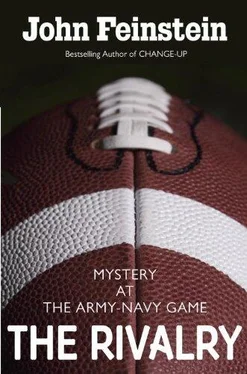So the game went to overtime.
In the NFL, overtime was played like a real game: there was a coin toss, followed by a kickoff, and the first team to score won the game.
But in college football, it was completely different. A coin toss decided who got possession first. Then the ball was placed on the 25-yard line and the team tried to score from there. Regardless of whether they scored or not, the other team also got the ball at the 25. So if the first team to have the ball scored a touchdown, the other team had to match that or the game was over. If the first team kicked a field goal, then the other team could tie with a field goal or win the game with a touchdown. If the score was still tied after each team had the ball, the game continued with another pair of possessions.
Georgia Tech won the toss and elected to defend first.
“You always want to let the other team have the ball first so you know exactly what you need to do when you get the ball,” Kelleher said.
“But if they go to a second overtime, Georgia Tech gets the ball first, right?” Stevie said.
Kelleher nodded. “Yeah, they alternate,” he said. “Plus, Army gets to decide which end of the field they’re going to play on, and they’re going to make Tech play right in front of the corps.”
It was clear to Stevie, from Army’s play-calling, that Coach Ellerson still believed in his defense: a fullback dive got two yards, a quarterback sprint gained two more, and another fullback dive was good for three. So it was fourth down, with the ball on the 18-yard line, and Jay Parker and the field goal team trotted on.
“Ellerson’s taking no chances,” Kelleher said. “I’m not sure that’s a good play.”
“I don’t like it at all,” Taylor said. “They’ve already driven the length of the field on us twice in this half. Now they only have to go twenty-five yards to win the game.”
Parker nailed the field goal from thirty-five yards and Army led 17-14.
There was no break with change of possession; Georgia Tech’s offense trotted out, as did the Army defense.
Johnson had a reputation as a bit of a riverboat gambler in his play-calling. And even though a bold call had resulted in an interception earlier in the game, he was still thinking big. On first down, he called for a play-action fake to the fullback, and then Tech quarterback Lamar Goodes rolled out right and connected with a receiver streaking toward the sideline. He caught the ball in full stride at the 10 and looked like he might score, until one of Army’s safeties, Derek Klein, fought off a block and pushed him out of bounds on the 7-yard line.
“I just knew it.” Taylor shook his head.
“They haven’t scored yet, Doc,” Dicky Hall said.
“First and goal on the seven…,” Taylor said.
Johnson went for the quick kill on the next play, calling another play-action pass, but this time Army had everyone covered and Goodes threw the ball away. Second and goal. On second down, Tech went with a run up the middle and plowed to the 4-yard line. Instinctively, Stevie looked up at the clock and then realized it was at 0:00. There was no clock in overtime.
“What’s he do here?” Tim Kelly asked.
“He might call the same play, try to fool us,” Hall said.
“Roll out,” Taylor said. “Let the quarterback make a play with his feet or his arm depending on what he sees.”
Taylor had it right. Goodes rolled out, his arm cocked as if to pass. At the last possible moment, he pulled the ball down and charged toward the corner of the end zone. Two Army defenders came up to stop him, and they wrestled him down very close to the goal line.
For a split second, it looked as if Goodes might have scored. There was no signal from the officials. Finally the referee stood up with his right arm raised above his head in a clenched fist-the signal for fourth down. Nearly everyone in the stadium breathed a sigh of relief.
Stevie could see Paul Johnson at least five yards out onto the field pointing in the direction of the press box.
“He wants them to review it,” Kelleher said. “He thinks they scored.”
“You can’t blame him for asking, right?” Stevie said. From where he was standing, it was impossible to know if Goodes had gotten over the goal line or not.
“Yes, they really should review in this situation,” Kelleher said. “This is one time where you want to be a hundred percent sure.”
“The play is under review,” the referee said, turning on his microphone. “The ruling on the field is fourth down.”
And so they waited. Two minutes went by, then three. The crowd grew restless.
“The rule should really be that if they can’t be sure after two minutes of review, then the call on the field stands,” Kelleher said. “This is ridiculous.”
Another minute passed. Finally, the referee took off the headset that connected him to the press box and trotted back onto the field.
“After further review, the ruling on the field stands…”
He continued to talk, but Stevie couldn’t hear him over the wild cheering coming from the corps, which was directly behind where they were standing.
“Now what does Johnson do?” Stevie asked.
“Any other coach, I’d say he kicks the field goal and plays on in a second overtime,” Kelleher said. “But that’s not usually Paul’s way. He always thinks he can come up with a play to get what he needs, and it looks like he only needs about a foot.”
Johnson had called time out to think about it, and both teams were huddling around their coaches. The Army players were so close to Stevie, he could hear Rich Ellerson’s voice even over the din coming from the corps.
“He’s going to go for it,” Ellerson said. “He thinks they can make a play and win the game. So this is where we make a play and win the game. They will not run up the middle-that’s not what he does in these situations. We’re going to sell out on the quarterback sprint, okay? If he goes the other way, then I lost the game, so don’t even worry about it. Ignore the middle-we want maximum coverage on the sides.”
The teams trotted back out. Tech huddled up, even though the play had clearly been called on the sideline. Goodes brought his team to the line, barked signals, and took the snap. At first, Stevie thought Ellerson had blown it, because Goodes appeared to put the ball into his fullback’s stomach and the fullback flew through the air into the end zone.
But the fullback didn’t have the ball. Goodes had pulled it away at the last minute and was sprinting to his left, to the near corner, only a few yards from where Stevie, Kelleher, Hall, Kelly, and Taylor were standing. As Goodes tried to turn his shoulder toward the goal line, Stevie realized that at least a half dozen black-shirted defenders were pursuing him.
He held his breath as Goodes got to about the 3-yard line and tried to dive at the corner of the end zone. But at least three Army defenders were right in front of him. He struggled forward for an instant and then collapsed under a pile of black shirts, still a yard from the goal line.
Stevie heard a cannon go off somewhere and saw Kelly, Taylor, and Hall jump into a three-man hug. The entire Army team left the bench to celebrate. Stevie noticed something else: the Army defenders who had tackled Goodes had not gone into celebration mode right away. Instead, they reached down and helped him to his feet. Handshakes and hugs were exchanged.
Kelleher had a huge smile on his face. “You understand,” he yelled over the screams and shouts cascading down on them, “that there is NO way this team should beat a team with Georgia Tech’s talent. These kids do this stuff on guts and heart.”
As Kelleher talked, Stevie saw the Army players, having celebrated and then shaken the hands of the Georgia Tech players, walking back in their direction. The Tech players, he noticed, were right behind them.
Читать дальше












